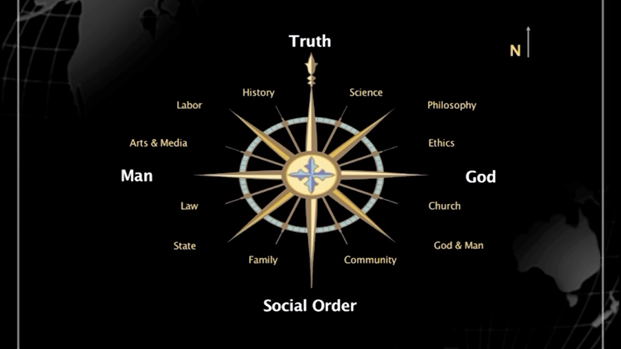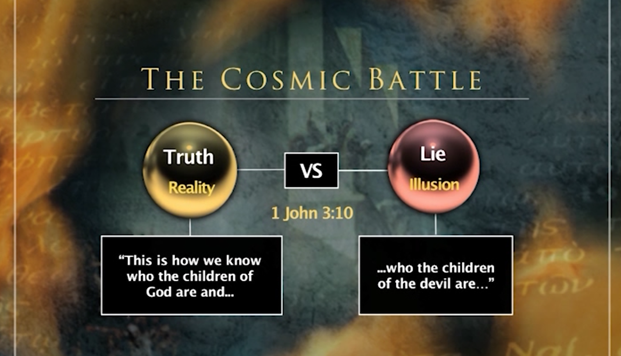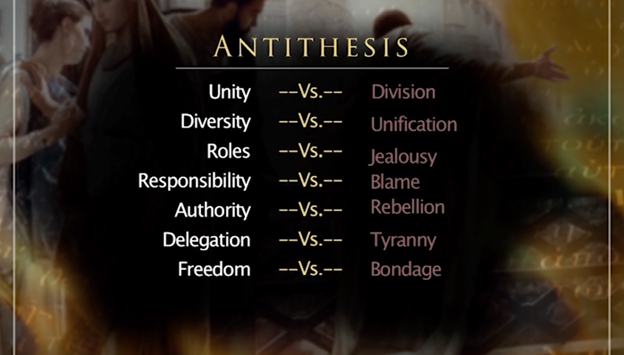This post is part 1 of a 12 part series about The Truth Project, an in-depth Christian Worldview experience led by Del Tackett and published by Focus on the Family.
According to Del Tackett, The Truth Project aims to be both a comprehensive and systematic overview of a Christian worldview. It is comprehensive because there is no area of life where God has not given us the answers to the fundamental questions in life through the Bible. It is systematic because the curriculum aims to review these areas in a systematic manner.
The goal is not to just understand this information, but ultimately to turn and gaze upon the face of God. We cannot gaze upon the face of God and not be unchanged.

Jesus Testified to the Truth
In lesson 1, Veritology: What is Truth, Tackett asks his class with a vitally important question: Why did Jesus come into the world? In other words, why did the God of the universe come into a corrupt world to die for sins?
Jesus answered this question before the civic ruler of his day, Pontius Pilate. “Then Pilate said to him, ‘So you are a king?’ Jesus answered, ‘You say that I am a king. For this purpose I was born and for this purpose I have come into the world—to bear witness to the truth. Everyone who is of the truth listens to my voice.’” (John 18:37)
The problem in our world is it’s full of lies. Isaiah said, “Justice is turned back, and righteousness stands far away; for truth has stumbled in the public squares, and uprightness cannot enter.” (Isaiah 59:14). Just as it was in ancient Israel, so also lies continue to confuse us – and keep us from the truth that Jesus presents.
“It is comprehensive because there is no area of life where God has not given us the answers to the fundamental questions in life through the Bible.”
The Truth Project
Tackett affirms that Scripture showcases a very close link between truth and salvation. One of the texts he provides is in Paul’s first epistle to Timothy when he wrote, “This is good, and it is pleasing in the sight of God our Savior, who desires all people to be saved and to come to the knowledge of the truth.” (1 Timothy 2:3-4, emphasis mine) In this text, we see people who are saved come to the truth as well. Truth and salvation are linked.
How We Respond to the Truth
In our fallen state we don’t respond well to truth. Paul even warned about people who would eventually turn away from the truth and turn aside to myths and false teachers (2 Timothy 4:3-4). This happens with unbelievers but it also happens to believers before conversion. There are other responses we have concerning the truth…
- We suppress the truth (Romans 1:18).
- We distort the truth (Acts 20:30).
- We reject the truth (Romans 2:8).
- We exchange the truth for a lie. (Romans 1:25).
And yet, Jesus tells us “everyone who is of the truth listens to my voice” (John 18:37). The Apostle John echoes his definitive claims to truth by aligning his teaching with Christ’s when he said, “We are from God. Whoever knows God listens to us; whoever is not from God does not listen to us. By this we know the Spirit of truth and the spirit of error.” (1 John 4:6). These are radical claims in Scripture. Jesus and the Apostle are on the side of truth and those who disagree are on the side of falsehood. These verses set up two sides of a battle between truth and error: the cosmic battle.
The Cosmic Battle Between Worldviews
This cosmic battle between truth and error started in the Garden of Eden in Genesis 3. The serpent told the first lie on earth against God’s truth to Eve when he said, “You will not surely die” (Genesis 3:4). Instead of listening to the truth, Eve believed a lie. She thought she could eat from the tree and still live. Eve was wrong. And we have been following her lead in believing lies ever since. Following lies affects us in multiple ways – especially in our sin.
- Those who follow lies and don’t love the truth are not saved. (2 Thessalonians 2:10)
- Our old self is being corrupted by deceitful desires. (Ephesians 4:22)
- Sin deceives us. (Romans 7:11)
- Sin’s deceitfulness hardens us. (Hebrews 3:13)
Every sin that besets us can be traced back to our belief in a lie. Just like Eve’s belief in a lie led her to rebel against God, so also we believe in something untrue every time we sin.

Antithesis
This system of truth and error sets up an antithesis. Wherever God’s truth is revealed, the Satanic lie militates against his truth with an opposite claim. In fact, whatever biblical claim God stakes in a particular area, the exact opposite is the false claim of the world, the flesh, and the devil. This is the antithesis between truth and error:
“Every sin that besets us can be traced back to our belief in a lie.”
Del Tackett
- Unity vs. Division:
For example, where God’s set up an order in marriage between one man and one woman for life in unity, the lie of the world is that divorce is the best answer when marriage is hard leading to division.
- Diversity vs. Unification:
For example, God shows a diversity and complimentarity between the sexes and therefore forbids homosexual relations. The lie aims to approve and celebrate homosexual relationships. - Roles vs. Jealousy:
For example, God set up particular roles for people to exercise, but the lie bucks at the roles God set up and inserts jealousy between people because of those roles.
- Responsibility vs. Blame:
For example, God has given people responsibility to exercise responsibility in their roles, but the lie is that we should not take responsibility and instead blame others. - Authority vs. Rebellion:
For example, God gave some people and leaders authority to rule in the state, the church, and the home. But the Satanic lie aims to rebel against God’s order in each sphere.
- Delegation vs. Tyranny:
For example, God has granted to leaders the grace of delegation and distribution of various powers among a people, but the opposing falsehood is tyrannical rule.
- Freedom vs. Bondage:
Finally, when the biblical mandate is for people to have freedom in Christ. The lie is that we don’t enjoy freedom with Christ – instead we are in bondage to sin.

What is Truth?
Tackett then moves to the question “what is truth?”. This question has challenged philosophers and theologians for millennia. The video offered a few definitions of truth, but RC Sproul’s definition seems to capture the nature of truth best: “Truth is defined as that which corresponds to reality as perceived by God.”
In other words, truth is reality as God sees it. As much as we perceive reality in the way God sees it, then we perceive reality correctly. That is truth.
“Truth is defined as that which corresponds to reality as perceived by God.”
R.C. Sproul
Those who connect well with reality are connected to truth. On the other hand, insanity is a loss of connection to reality. Insanity can affect people severely like those who are committed to insane asylums. Most people recognize anyone claiming to be Napoleon as insane. But insanity can also affect us in a more common sort of way. This is the kind of “insanity” which is disconnected from the reality God explains in his word. Jesus addressed “common insanity” in Matthew 6:25-34
“Therefore I tell you, do not be anxious about your life, what you will eat or what you will drink, nor about your body, what you will put on. Is not life more than food, and the body more than clothing? Look at the birds of the air: they neither sow nor reap nor gather into barns, and yet your heavenly Father feeds them. Are you not of more value than they? And which of you by being anxious can add a single hour to his span of life? And why are you anxious about clothing? Consider the lilies of the field, how they grow: they neither toil nor spin, yet I tell you, even Solomon in all his glory was not arrayed like one of these. But if God so clothes the grass of the field, which today is alive and tomorrow is thrown into the oven, will he not much more clothe you, O you of little faith? Therefore do not be anxious, saying, ‘What shall we eat?’ or ‘What shall we drink?’ or ‘What shall we wear?’ For the Gentiles seek after all these things, and your heavenly Father knows that you need them all. But seek first the kingdom of God and his righteousness, and all these things will be added to you. Therefore do not be anxious about tomorrow, for tomorrow will be anxious for itself. Sufficient for the day is its own trouble.”
In this passage, Jesus was appealing to the reality of God’s care for his children and showing that we should therefore not worry. Since God cares for birds and flowers, we should trust God to care for us as his children. After all, we’re worth more than birds and flowers. Therefore, we shouldn’t be worried about everything non-believers worry about. To worry reflects a “common insanity” or disconnection from the knowledge that God cares for his children.
Application: Faith Connecting Us to God
Finally, Tackett ended the first lesson on faith. Faith is our connection to God. Faith is the means by which we can escape “common insanity” or mistaken, worldly beliefs. Fundamentally, genuine faith is not a feeling. Instead, faith is the grip by which we hold onto God by believing his word. As a frightened young child jumps from a diving board into a pool for the first time to his mother, so also we jump into God’s endeavors knowing he will uphold us in his will.



